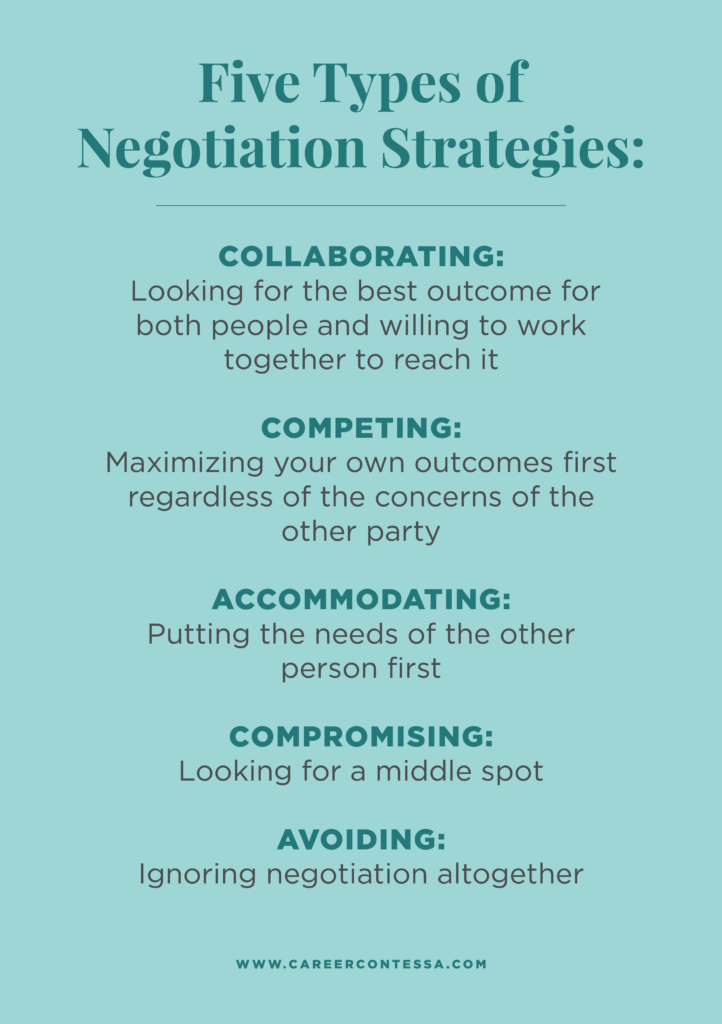3 Salary Negotiation Strategies That Work + 3 Negotiation Mistakes
If the idea of salary negotiation makes you nervous, you’re not alone.
Maybe you recently a new job offer, and you’re reviewing the compensation package. Maybe you’re negotiating your salary in your current role. Whatever the case, there are salary negotiation strategies that lead to success—and salary negotiation mistakes that do more harm than good.
A survey by Salary.com discovered that only 37% of people always negotiate their salaries—while a shocking 18% never do.
Even worse, 44% of respondents claim to have never asked for a raise during their performance reviews.
The biggest reason for not negotiating your salary? Fear.
We think it’s way scarier to leave your earning potential on the table! Stanford negotiation professor Margaret A. Neale explains the impact of not negotiating:
“If you get a $100,000 salary and your co-worker negotiates up to $107,000, assuming you’re treated identically from then on, with the same raises and promotions, you’d have to work eight years longer to be as wealthy as them at retirement.”
Yikes. We don’t want that for you, so it’s time to learn how to negotiate. Here are three expert strategies to confidently get the most out of your salary—and three strategies that don’t work.
Salary Negotiation Strategy #1: Ditch Your Fear And Know Your Value
As we mentioned, salary negotiations are nerve-wracking and can shake even the most confident negotiator. Because money can be an emotional trigger, it can feel personal. When things feel personal, it’s easy for impostor syndrome to make us doubt our worth, focus on our weaknesses, and make compromises before we’ve even started conversations.
So how do you get out of your own head and ditch the inner critic?
We recommend getting clear about your value and past accomplishments. To get started, gather information through your own self-reflection or get feedback from coworkers that remind you of the value you bring to an organization—especially when it comes to your experience and your strengths.
You basically want to be able to “defend” or fight off your negative thoughts with real-life examples that are positive.
Replace This Negative Thought:
“I’ve only been with my current employer and this role for a few years so that’s why I won’t be paid more than X.”
Try This Positive Repositioning:
“Since I’ve been in this role I’ve accomplished X, Y, and Z. This is why my skills are valuable to whatever organization I’m using them at.”
You can also use this time to prepare for what alternatives to salary increase you would consider. It’s like having more tools in the toolbox should you need flexibility in your negotiation.
Lastly, get to know where you’re the most vulnerable and insecure. For example, maybe you’re insecure about your work history since you’re making a career transition.
Plan ahead to compensate for those insecurities. Consider the transferable skills you’d bring to the role or the other industry insight you have that you can share with enthusiasm. Be ready to negotiate. Be ready to counteroffer. Be ready to negotiate your worth.
Salary Negotiation Strategy #2: Let The Company Make The Initial Offer
Another way to think about this is to delay providing an exact salary number for as long as possible when you’re interviewing for a new role. The recruiter will ask you what your salary expectations are, but we recommend not answering this with an exact number right away.
First, you don’t know that much about the role till later in the interview process, and secondly, what if you name a number much lower than what they budgeted?
Scripts to Use to Let the Company Name Their Salary Offer
To begin, you can try this firm, but fair script:
“I am very interested in this job, and I’m sure we can agree on a salary once we have both determined that there is a good fit here.”
You can also try this script, which requires a little more information from the company or hiring manager:
“I’m really interested in the role and once I’ve learned more specifics about the job, I can share the range I’d expect for this role, however, it would be helpful to hear what range you have budgeted to make sure we’re not too far apart right now.”
Perhaps they will share the salary range they have budgeted for the role. At the very least, you will buy yourself time so you can learn more about what the role is expecting from you so you’re providing a well-informed salary number later on.
If you’re negotiating a raise in your current role, we also recommend letting your company throw out the salary raise number. Your company has access to way more salary data for your role than you do. First, they know how much everyone is making, their career level, and how they come up with compensation ranges.
“I’d like to discuss the path to [JOB TITLE] or at least the compensation equivalent.”
After you’ve made your ask with a strong case for why you deserve a raise, try something like, “Given all of that background information, I’d like to discuss an increase in my compensation.”
Whether it’s a new job or your current role, try to let the company anchor the salary conversation because it could be a lot more than what you were initially planning on asking for or, if it’s less, you can determine how big of a gap you and the company have between you.
Salary Negotiation Strategy #3: Consider The Context
Not all companies are created equally. Larger more established corporations usually have a well-defined recruiting and hiring process that includes recruiters, HR and benefits personnel, and even an onboarding team once you’re hired.
Salary Negotiation at a Larger Company
Additionally, larger companies will often have an in-house compensation team or at least access to compensation consultants who set formal salary bands, career levels, and job categories with set salary ranges.
In a more structured environment, try to learn what the salary levels are and what determines where a person falls on a level. For example, try to figure out what pay category someone with your education level and experience would receive, then build a case for a starting salary at the high end of that range.
But how do you build this case? David Lax and James Sebenius, authors of 3-D Negotiation: Powerful Tools to Change the Game in Your Most Important Deals call this a “non-offer offer.” The goal is to anchor the salary conversation on the higher end. Let’s use an example to illustrate this.
Let’s say your salary research shows that you fall in the $90,000- $100,000 salary range given your experience, education, background, etc. Instead of asking for a $100,000 salary, which would put you at the top of that set salary range, aim for the next category with a higher salary.
Lead with curiosity and say something like, “I’ve heard that people similar to me typically earn a salary between $100,000- $110,000. Is that correct?” What makes this a “non-offer offer” is that you’re not making a demand, but rather you are anchoring the conversation around a desired salary range of $100,000- $110,000.
And while this anchor range might not be relevant to your salary negotiation conversation, it could very well steer the numbers toward your upper goal by making the organization reconsider what salary range they think is a fit for you.
Salary Negotiation at a Smaller Company
On the opposite end of the spectrum, you have smaller companies. These could fall under the category of startups, family businesses, or solo entrepreneurs.
When you’re being recruited to be their second employee you probably won’t come in contact with a recruiter, hiring manager, or HR department, nor will your salary be determined by existing pay scales. The boss usually sets this payscale without the help of a compensation expert either.
In this case, you may have more opportunities to structure a creative package that includes perks like:
- Stock options,
- Remote work or flexible work
- Signing bonus
- Extra vacation time
- Other benefits and perks
Since you’d be negotiating directly with the decision-maker, they might have less structure around their compensation packages.
There are pros and cons to each type of company. The only way to know which type is the right fit is to examine what’s important for you and your personality type.
Salary Negotiation Mistake #1: Only Using Online Salary Databases For Salary Research
Instead: Talk to real people for your salary research
You will want to determine the market value for the role you’re either interviewing for or your current job. A good place you can start that’s easy and fast is through online salary databases. We have a database, The Salary Project, with tens of thousands of salaries. It’s free and anonymous.
The trick here is that you can’t rely solely on online salary databases. They are crowdsourced data and they are not viewed as “reliable” by compensation experts and recruiters as we learned from David Buckmaster in this podcast episode about salary secrets. This just means that you’ll want to find other sources to back up your claims.
The next best thing? Talking to real people in similar roles and working within similar industries. It’s important to make sure you’re asking both men and women about their salaries to account for the gender pay gap and other salary pay gaps that we know also exist for BIPOC individuals.
Ask Real People About Their Salaries
To do this, start with your network. Who do you know either directly or through your contacts that work in a similar role and company? Can you connect with them via email or phone? Here’s what you might ask to get the conversation started:
“I’m researching the market rate for my job in [JOB TITLE] within [INDUSTRY/DEPARTMENT]. Since you’re in a similar role and company, I was curious if you’d be willing to share your salary information or salary range with me. I’m reaching out to a few other people in our field and would be happy to share my findings with you—and keep your name anonymous!”
If you’re transitioning careers or you’re still building your network, cold outreaches can work too. You will have to send a lot more emails, but it’s possible to gather salary data from cold contacts. Start by finding people via LinkedIn in similar positions and adding them as connections.
Once you have their email address, send them an email like this:
“Hi Name,
Thank you for accepting my connection! I’m reaching out to people in similar roles and industries as part of my salary research and to better understand what the current market rate is for roles like ours. Would you be willing to share your salary information or salary range with me to help me? I’m reaching out to other professionals and would be happy to share my findings with you and keep your name anonymous! Let me know what you think!
Thank you,
Name”
If you’re going to ask for a raise within your current job and want to learn more about the market rate for your role, go ahead and ask. Reach out to someone in a similar position, preferably someone who was hired within the past six months, and ask what they were offered.
Here’s how you might frame that ask:
“I’m doing some salary research to determine the current market rate for my role and who better to ask than someone who was recently hired. Would you be open to helping me by sharing your salary or salary range with me? I’m happy to share what my current salary is and the other parts of my compensation package with you as well. Let me know what you think!”
Salary Negotiation Mistake #2: Forcing Your Negotiation Style
Instead: Adapt your style to increase your success rate
Everyone has their own unique negotiation style similar to how we all have our own unique leadership and communication styles. However, your style can greatly impact the success of your salary negotiation.
In a study published in the Journal of Organizational Behavior, Michelle Marks of George Mason University and Crystal Harold of Temple University found profiled different styles of negotiation.

Five Types of Negotiation Strategies:
- Collaborating: Looking for the best outcome for both people and willing to work together to reach it
- Competing: Maximizing your own outcomes first regardless of the concerns of the other party
- Accommodating: Putting the needs of the other person first
- Compromising: Looking for a middle spot
- Avoiding: Ignoring negotiation altogether
The first finding that stood out to us was that you should always negotiate! People who negotiated their salary, rather than accepting the first offer, increased their starting pay by an average of $5,000, and the strategies that accomplished this were mostly competing and collaborating.
Next, when people used compromising and accommodating strategies, they were less likely to get salary increases. So, it turns out that adapting your negotiation style and strategy pays—and it pays more to be assertive when asking for what you want.
Salary Negotiation Mistake #3: Focusing Only On The Salary Number
Instead: Consider the total compensation package
We can keep this tip short and sweet with a BIG reminder that your “good” salary number is not everything! The monetary value of your benefits can add up. For example, does your employer pay for a portion of your healthcare? Do they offer stock options? Does your employer offer a 401K and 401K match?
Perhaps your employer allows remote work, which saves you time and money on a commute. Do not disregard the value—including the non-monetary value—you get from some employer benefits and perks.
Also, certain jobs offer commissions and bonuses that can add up to something more lucrative than any base salary you had considered.
We have a great podcast episode with three of our career coaches who cover ideas for things you can negotiate beyond salary. Don’t get totally stuck on the salary number, and get creative with other things you can get value from.
World’s Best Hack: A Script To Ask For A Raise
Download our free raise script + learn:
Heads up! By downloading our script you’re agreeing to join our newsletter. You can unsubscribe at any time!







